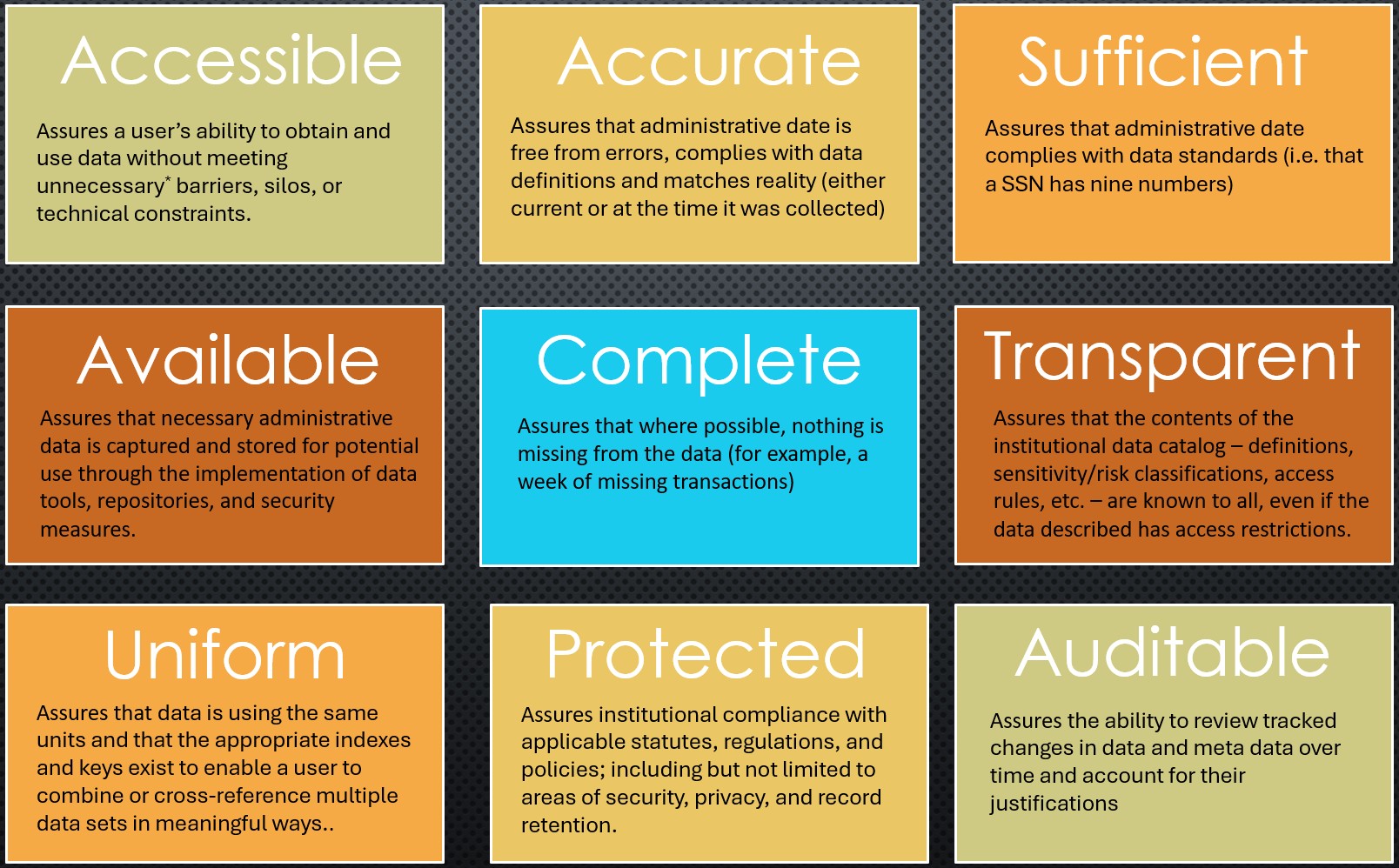The Value of Data Governance at Colorado College
In order to achieve its mission, Colorado College must competitively and accurately meet the educational expectations of its students and the market expectations of its employees. Doing so requires CC decision-makers at all levels have an ability to easily access appropriate and trusted information enabled through Data Governance.
Data Governance can be defined as the overall ethical management of the availability, usability, integrity and security of data used in an organization. It is the foundation on which all other data management and analysis efforts must be built at Colorado College and requires a shared campus data culture to be successful.
The goal of Data Governance is to build and sustain trust that institutional data is:

Long-term strategic benefits of well-maintained Data Governance oversight include:
- Data-Driven Insights: A strong data governance framework ensures that accurate, timely, and complete data is available, allowing institutional leaders to make strategic decisions.
- Predictive Analytics: Institutions can leverage historical and real-time data to identify trends, forecast enrollment patterns, track graduation rates, and predict student performance.
- Streamlined Operations: Data governance supports the alignment of institutional policies and resources with key performance metrics, improving efficiency across administrative, academic, and financial processes.
- Eliminates Redundancy: By ensuring proper data management practices, unnecessary duplication and data silos are reduced.
- Higher education institutions are subject to numerous laws and regulations (e.g., GDPR, Title IX, FERPA, and others). Effective data governance ensures compliance with these legal frameworks by implementing policies and monitoring access controls.
- Reduces the risk of breaches, data misuse, and non-compliance penalties through standardized practices and oversight.
- Data governance establishes rules for maintaining accuracy, completeness, and consistency across institutional data sources, enabling better analysis and reporting.
- Institutions can ensure that data collected from diverse departments or systems is reliable and aligned across the board.
- Early Intervention: Institutions can use governance strategies to identify at-risk students by tracking patterns in enrollment, grades, attendance, and other data points.
- Personalized Support: Reliable data enables institutions to provide tailored academic and career support to students.
- Holistic Student Insights: Coordinated data across departments leads to a better understanding of each student's needs, background, and journey.
- By managing and governing data effectively, universities can identify areas of resource inefficiency and target funding, staffing, and other resources to the areas most in need.
- Supports long-term planning related to infrastructure, faculty, programs, and technological investments.
- Data governance frameworks establish policies for access, encryption, and monitoring, ensuring sensitive information (e.g., financial aid records, student grades, and personal information) is protected.
- Regular oversight and audits ensure compliance with security protocols and mitigate risks from cybersecurity threats.
- Data silos are a common challenge in higher education. Effective data governance fosters collaboration by ensuring departments share data securely and consistently.
- Supports cross-functional partnerships by aligning goals and data-sharing practices.
- Accreditation bodies often require institutions to provide evidence of their operational efficiency, student outcomes, and compliance with specific standards.
- Data governance ensures that reporting is accurate, timely, and transparent, thus easing the process of meeting accreditation, Title IV and other reporting requirements.
- Data governance provides the foundation for exploring innovative teaching methods, technological solutions, and program development by offering access to clean, reliable, and real-time data.
- Institutions can experiment with new strategies (e.g., online learning, predictive intervention models) without risking data mismanagement.
- Institutions that demonstrate commitment to transparency, compliance, and student data protection build trust with students, parents, and external stakeholders.
- A clear data governance strategy reassures stakeholders that an institution is well-managed, efficient, and forward-thinking.
show all / hide all
